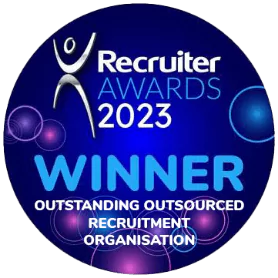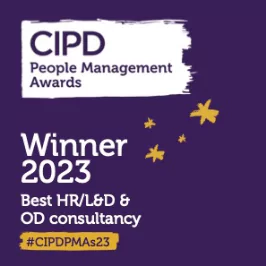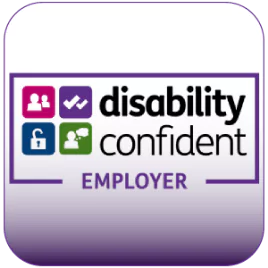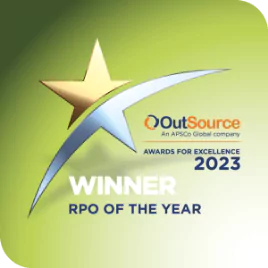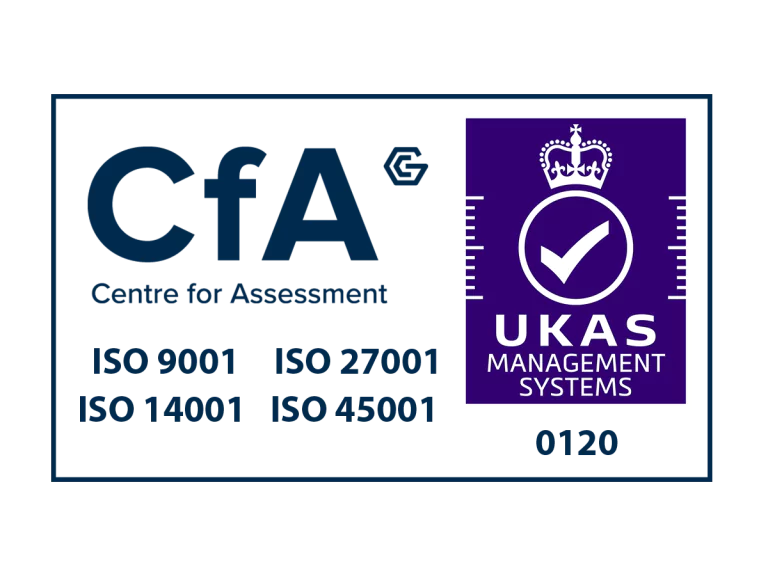Following their co-hosted workshop at LinkedIn’s London HQ, Omni and Vercida share their top takeaways on attracting diverse talent
For many years Diversity and Inclusion (D&I) has been an agenda item at Board level with initiatives designed and developed to reduce bias in organisational decision making. This is seen particularly within resourcing functions, where the need to attract and retain as diverse a range of talent as possible can no longer be a product of tokenism but must be a business imperative.
The key takeaways from the workshop will help you sense-check your current D&I processes and provide food for thought on where you can improve and the steps you need to take.
Takeaway 1: Reworking your job design
Inevitably over time organisations tend to develop their own jargon. A bi-product of this is that we assume this language makes sense to everyone working in our sector and will resonate with those from outside who may be interested in making a move. However, the reality may be different and from the outset of the hiring process, we may already be putting barriers between ourselves and ‘potential talent’, engaging instead with like-for-like candidates.
Even subtle word choices can have a strong impact on the candidate pool. For example, research suggests that job descriptions which include words such as ‘cooperative’ and ‘collaborative’ tend to attract women rather than men. Alternatively, words such as ‘competitive’ and ‘determined’ may attract a higher percentage of males. When you are writing job descriptions, choose your words carefully so that they can be understood by an ‘outside’ person and are neutral e.g. ‘takes pride in performing well’ over ‘competitive’. EDI Training can certainly support hiring and TA managers in getting these nuances correct.
Running simple accessibility audits will help you identify areas of improvement to maximise inclusivity. Software programmes (e.g. gender decoder) can help in highlighting stereotypical words, providing guidance on how to provide balance using complementary language.
Takeaway 2: Widen your search – Targeting unprecedented groups
The placement of your job adverts will ultimately impact the talent you attract. The reason you are not attracting a diverse range of candidates is not that they ‘just haven’t applied’! A multi-level sourcing strategy can certainly help you attract, hire and retain those hard to reach candidates.
In today’s digital age there are so many ways in which you can advertise jobs from company careers boards to social media platforms to good old print. Widening your search doesn’t mean spraying and praying – it means focusing on channels that will target the candidates you want to engage.
The use of recruitment marketing platforms including Proud Employers, part of Stonewall working with the LGBT community or Women in Tech who are working to increase the number of females in the technology sector, will enable you to map talent and create targeted campaigns, focused towards diverse candidates. Associate consultant at Omni Suzanne Brown shared… “Be proactive in your recruitment choices and processes, make sure that you are taking the right steps to attract and advertise these roles to that diverse group.”
Additionally, ensuring your application process is inclusive is another vital component. Is it accessible and flexible? Can applicants easily guide themselves through the process?
Are the messages you give about completing the application forms friendly and inclusive, or overly formal and off-putting?
Your organisation’s tone of voice really does matter. It is vital that you don’t forget the basics. For example, your commitment to equal opportunities is something that really matters to your candidates. Ask yourself does your equity and diversity commitment stand out the way it should?
Takeaway 3: Becoming bias-free
Bias exists in many forms and recruiters often don’t even know that they are doing it. The more conscious you are of the types of bias that exist the more you will be able to ensure you take steps to reduce the amount of bias in your resourcing processes. Becoming bias-free requires a rigorous assessment of your workplace policies and practices to ensure you are being transparent and fair to applicants, employees and customers. Your hiring process should be structured in order to ensure that all candidates are assessed in the same manner and against the same criteria.
Dan Robertson Director at Vercida Consulting shared some of the bias that occurs within the resourcing process.
CONFIRMATION BIAS: This tends to occur in the short-listing process, how do you whittle your way down to the top 3 candidates? This is a type of cognitive bias that involves favouring traits/ information that supports and confirms your existing beliefs. Here, it may be useful to adopt a blind decision-making approach, removing certain information that may influence your choice such as where the candidate went to university, age, background.
AFFINITY BIAS: is a tendency to favour people who are typically like us. This type of unconscious bias is likely to be prominent in the face-to-face interview stages. Although it is important in organisation culture that the person is like you in the sense of sharing the same values and ambitions, this affinity bias can be problematic in that people hired into the business can inherit a certain persona, stifling different ways of thinking that can add so much value to organisations. Make sure your interview panel is varied and that your personal thinking is challenged before any hiring decision is made.
All told, inclusive recruitment and attracting diverse talent is an end-to-end process and there a lot of component parts when making changes for the better.
Other forms of unconscious bias are captured in the image below
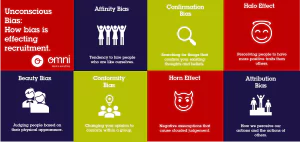
How can Omni help you?
Audit, Assess, Action
Pioneering a fresh and positive approach to inclusive recruitment, we have developed a unique service focused on recruitment attraction aligned with a commitment to Diversity and inclusion (D&I) – The Recruitment Effectiveness Assessment (REA).
Whether you want to focus on one specific element or the whole recruitment process in its entirety, our internal recruitment training provides the necessary level of detail to leave you feeling confident in your role.
Recruitment Process Outsourcing (RPO)
Providing organisations with a total recruitment outsourcing solution, our RPO service encompasses the entire recruitment lifecycle from sourcing through to onboarding and beyond, leaving your in-house HR team to focus on other high-value activities.





